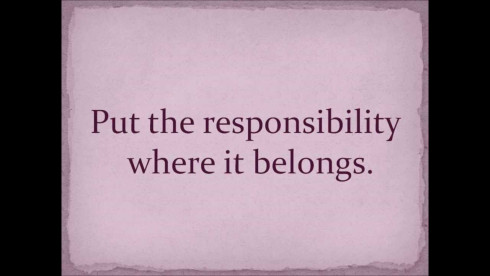Sexual assault: ask the right questions or you’re part of the problem

There was a brief spat on Twitter this morning with a couple of men who thought the question to ask about the fourteen-year-old girl raped in a Geelong Park at 4 a.m. was, what we her parents thinking, letting her out at that time in the morning?
The attitude persists that girls and women must restrict our lives to protect ourselves from sexual assault, rather than the obvious solution, which is that men must not rape us.
The one good thing to emerge so far from this awful event are the words of Detective Senior Sergeant Jason Walsh, from Victoria Police’s Sexual Crime Squad, who expressed regret and amazement that people feel free to question a sexual assault victim’s actions, when what ought to be under scrutiny are the actions of perpetrators.
I find it amazing, he said, without getting into politics, that we question girls and we question their behaviour when we don’t even ask, ‘what’s four blokes out doing, allegedly sexually assaulting a young girl?’
“You know, that’s my take on that sort of question, and I’ve been in this sexual assault field for many years, and I find it amazing that people straight away question females for their actions, and they’re not questioning the males. I mean, what are four males doing allegedly sexually assaulting a young girl? That’s a question I’d ask.”
The self-serving myth that women “ask for it” one way or another is still pervasive, an estimated 70% of sexual assaults are not reported, of those that are reported only a minuscule number actually make it to court and even less result in convictions. The court process can be so horrendous for the victim that it’s frequently described as “being raped again,” and I recently read a paper written by Kylie Weston-Scheuber, Supervising Lawyer, Sexual Offences Unit, Office of the DPP (ACT) in which she states that should she find herself a victim of sexual assault, there are days she has doubts about whether she’d subject herself to the trauma of court proceedings.
Ms Weston-Scheuber also comments on the popular notion that women make this stuff up, by pointing out that the court process is so grueling, in itself it ought to be evidence that the woman has suffered sexual assault because nobody would subject themselves to the trauma without extremely good reason:
…the trauma and indignity of giving evidence in a sexual assault trial is the strongest disincentive imaginable to continuing with a fabricated sexual assault allegation. However, the law precludes the prosecution from even raising the spectre of this feature of a witness’s evidence, which might be thought to be strongly corroborative.
Of course, the reality that many complaints don’t go to court doesn’t mean a victim wasn’t sexually assaulted, and it doesn’t mean the alleged perpetrator is innocent. While the victim doesn’t have her chance at justice, however traumatising that chance can be, neither does the alleged perpetrator have the chance to clear his name. He remains, for the rest of his life, an alleged perpetrator of sexual assault. Insufficient evidence, or the victim withdrawing out of fear of ongoing traumatisation, does not equate to exoneration of guilt.
There is something terribly awry with a system that causes sexual assault victims to be further traumatised in their fight for justice. However, it is within such a system that questioning the victim’s responsibility for the suffering inflicted on her by the perpetrator is still regarded by some as legitimate. So if you do ask why she was in the park, drunk, wearing a short dress or whatever victim-blaming inquiry you come up with, perhaps you need to ask yourself, why am I blaming her?
This article was originally published on No Place For Sheep.








